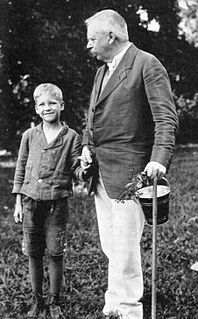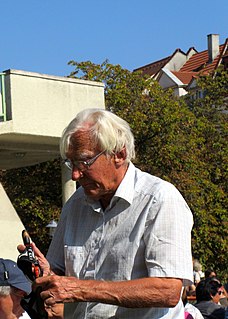
Heidelberg University, officially the Ruprecht Karl University of Heidelberg, is a public research university in Heidelberg, Baden-Württemberg, Germany. Founded in 1386 on instruction of Pope Urban VI, Heidelberg is Germany's oldest university and one of the world's oldest surviving universities. It was the third university established in the Holy Roman Empire.

Walther Wilhelm Georg Bothe was a German nuclear physicist, who shared the Nobel Prize in Physics in 1954 with Max Born.

Ernst Klee was a German journalist and author. As a writer on Germany's history, he was best known for his exposure and documentation of the medical crimes of Adolf Hitler's Third Reich, much of which was concerned with the Action T4 or involuntary euthanasia program. He is the author of The Good Old Days': The Holocaust Through the Eyes of the Perpetrators and Bystanders first published in the English translation in 1991.

Dieter Borchmeyer is a German literary critic.
Gerhard Scherhorn was a German Professor and economist.

Karl Kuno Thure Freiherr von Uexküll was a German scholar of psychosomatic medicine and biosemiotics. He developed the approach of his father, Jakob von Uexküll, in the study of living systems and applied it in medicine.

Dietmar Otto Ernst Rothermund was a German historian and professor of the history of South Asia at the Ruprecht-Karls University in Heidelberg. On an international level, he was considered an important representative of German historical scholarship. Although he began his academic career as an Americanist, he succeeded in establishing a special status for himself in the German historiography of South Asia. Thus, his concern was always to lay the foundation for South Asian Studies in Germany and Europe. The bond Rothermund had with India was not only of a professional nature, but also of a private one. His wife Chitra née Apte, with whom he had three children, was from Pune, Maharashtra, India.

Konrad Ott is a German philosopher with a special interest in discourse ethics and environmental ethics.
Thilo Marauhn is a German expert on international law. He currently holds the professorship for Public Law and International Law at the Justus Liebig University Giessen and heads the research group “International Law” at the Leibniz Institute Hessische Stiftung Friedens- und Konfliktforschung / Peace Research Institute Frankfurt (PRIF).
Architectural and environmental psychology developed within the German-speaking world in the 1970s. In 1972, W.F.E. Preiser stated: “What is of special interest to environmental psychologists are the rules by which person-environment relationships are determined and adjustments to changing environmental conditions are enabled within cultural realms. Designers of environments, in particular architects and city planners, need measurements on how the variables they have manipulated affect users.” Early concepts revolved around the psychosocial roles of public and private space, interpersonal conflict, quality of living, and noise pollution. Later concepts explore the relationship between built environments and climate change.
Wolfgang Zapf was a German sociologist.
Heinz-Herbert Noll is a German sociologist.
Sabine Funke is a German painter who lives and works since 1987 in Karlsruhe.
Florian Steger is a German medical historian and medical ethicist.
Marika Geldmacher-von Mallinckrodt, nee von Mallinckrodt-Haupt was a German chemist, physician and professor at the University of Erlangen. Her main focus in research was on forensic toxicology, forensic and clinical-toxicological analytics and ecogenetics.

Paula Hertwig was a German biologist and politician. Her research focused on radiation health effects. Hertwig was the first woman to habilitate at the then Friedrich-Wilhelms-Universität Berlin in the field of zoology. She was also the first biologist at a German university. Hertwig is one of the founders of radiation genetics alongside Emmy Stein. Hertwig-Weyers syndrome, which describes oligodactyly in humans as a result of radiation exposure, is named after her and her colleague, Helmut Weyers.

Helm Stierlin, born as Wilhelm Paul Stierlin, was a German psychiatrist, psychoanalyst and systemic family therapist. From 1974 to 1991 he was the medical director and chairowner of the Department for psychoanalytic basic research and Family Therapy at the Medical Faculty of the University of Heidelberg. Stierlin contributed significantly to the establishment and further development of systemic therapy in Germany.

Alexander Moutchnik is a professor of media economics and media management. He focuses on social media, media history, sustainability and corporate social responsibility. Since 2013 Moutchnik has been teaching at the RheinMain University of Applied Sciences in Wiesbaden (Germany) in the Department of Design, Computer Science and Media.
Hans Wolfgang Schumann was a German diplomat as well as an Indologist and Buddhologist.

Dietmar Schneider is a German internist, neurologist and an extra-curricular professor for neurological intensive care medicine, 1997 at the University of Leipzig Medical Center.











